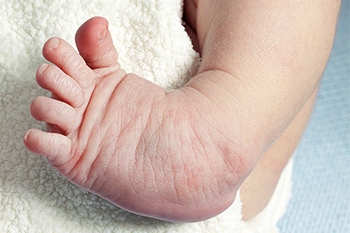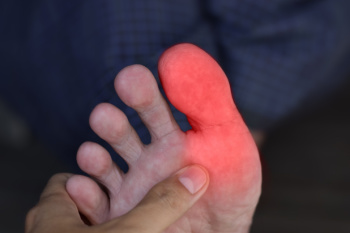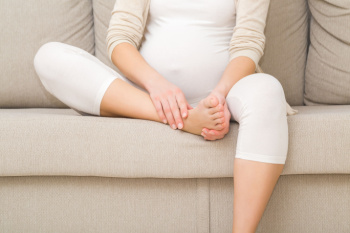Connect With Us
Blog
Items filtered by date: September 2024
Facts About Clubfoot

Clubfoot, medically referred to as talipes equinovarus, is a congenital deformity affecting roughly one in every 1,000 newborns. Clubfoot occurs when the feet turn inward and upward toward the ankle, affecting either one or both feet. While it is more common in boys than girls, there is no definitive cause for clubfoot, though genetics and environmental factors may play a role. If untreated, it can significantly impact a child’s ability to walk, leading to pain and long-term mobility issues. Fortunately, early intervention with treatments such as the Ponseti Method can help correct the congenital deformity. This non-invasive technique involves a series of casts, sometimes followed by a minor surgical procedure to lengthen the Achilles tendon, and a brace to maintain foot alignment. With prompt attention, most children with clubfoot can develop healthy, functional feet. If your child has clubfoot, it is suggested that you make an appointment with a podiatrist for an exam, diagnosis, and treatment options.
Congenital foot problems require immediate attention to avoid future complications. If you have any concerns, contact one of our doctors of Advanced Podiatry. Our doctors can provide the care you need to keep you pain-free and on your feet.
Congenital foot problems are deformities affecting the feet, toes, and/or ankles that children are born with. Some of these conditions have a genetic cause while others just happen. Some specific foot ailments that children may be born with include clubfeet, polydactyly/macrodactyly, and cleft foot. There are several other foot anomalies that can occur congenitally. What all of these conditions have in common is that a child may experience difficulty walking or performing everyday activities, as well as trouble finding footwear that fits their foot deformity. Some of these conditions are more serious than others. Consulting with a podiatrist as early as possible will help in properly diagnosing a child’s foot condition while getting the necessary treatment underway.
What are Causes of Congenital Foot Problem?
A congenital foot problem is one that happens to a child at birth. These conditions can be caused by a genetic predisposition, developmental or positional abnormalities during gestation, or with no known cause.
What are Symptoms of Congenital Foot Problems?
Symptoms vary by the congenital condition. Symptoms may consist of the following:
- Clubfoot, where tendons are shortened, bones are shaped differently, and the Achilles tendon is tight, causing the foot to point in and down. It is also possible for the soles of the feet to face each other.
- Polydactyly, which usually consists of a nubbin or small lump of tissue without a bone, a toe that is partially formed but has no joints, or an extra toe.
- Vertical talus, where the talus bone forms in the wrong position causing other bones in the foot to line up improperly, the front of the foot to point up, and the bottom of the foot to stiffen, with no arch, and to curve out.
- Tarsal coalition, when there is an abnormal connection of two or more bones in the foot leading to severe, rigid flatfoot.
- Cleft foot, where there are missing toes, a V-shaped cleft, and other anatomical differences.
- Macrodactyly, when the toes are abnormally large due to overgrowth of the underlying bone or soft tissue.
Treatment and Prevention
While there is nothing one can do to prevent congenital foot problems, raising awareness and receiving neonatal screenings are important. Early detection by taking your child to a podiatrist leads to the best outcome possible.
If you have any questions, please feel free to contact our offices located in Needham, Norwood, and Hanover, MA . We offer the newest diagnostic and treatment technologies for all your foot care needs.
Possible Causes of Big Toe Pain

Sharp pain in the big toe can be distressing and may arise from several conditions. Gout, a type of arthritis caused by uric acid crystals, often leads to sudden, intense pain in the big toe joint. Another common cause is bunions, which create a painful bump at the base of the toe due to misalignment. Turf toe, an injury from hyperextending the toe, can also cause sharp pain. Other potential issues include sesamoiditis, an inflammation of the small bones beneath the big toe, and ingrown toenails, which can cause localized pain and discomfort. To diagnose the cause, a podiatrist will assess your symptoms, examine the toe, and may order imaging tests. Treatment varies based on the diagnosis and includes medications, rest, proper footwear, or, in some cases, surgery. If you have big toe pain, it is suggested that you consult a podiatrist for an accurate diagnosis and management.
Toe pain can disrupt your daily activities. If you have any concerns, contact one of our doctors of Advanced Podiatry. Our doctors can provide the care you need to keep you pain-free and on your feet.
What Causes Toe Pain?
Most severe toe pain is caused due to a sports injury, trauma from dropping something heavy on the toe, or bumping into something rigid. Other problems can develop over time for various reasons.
Toe pain can be caused by one or more ailments. The most common include:
- Trauma
- Sports injury
- Wearing shoes that are too tight
- Arthritis
- Gout
- Corns and calluses
- Hammertoe
- Bunions
- Blisters
- Ingrown toenails
- Sprains
- Fractures (broken bones)
- Dislocations
When to See a Podiatrist
- Severe pain
- Persistent pain that lasts more than a week
- Signs of infection
- Continued swelling
- Pain that prevents walking
Diagnosis
In many cases the cause of toe pain is obvious, but in others, a podiatrist may want to use more advanced methods to determine the problem. These can range from simple visual inspections and sensation tests to X-rays and MRI scans. Prior medical history, family medical history, and any recent physical traumatic events will all be taken into consideration for a proper diagnosis.
Treatment
Treatments for toe pain and injuries vary and may include shoe inserts, padding, taping, medicines, injections, and in some cases, surgery. If you believe that you have broken a toe, please see a podiatrist as soon as possible.
If you have any questions please contact our offices located in Needham, Norwood, and Hanover, MA . We offer the newest diagnostic and treatment technologies for all your foot and ankle needs.
We Can Treat Your Foot or Ankle Pain
Causes of Painful Feet During Pregnancy

Pregnancy often brings about foot pain due to several factors. Collapsed arches, or fallen arches, are common as the body’s increased weight and hormonal changes put extra pressure on the feet, leading to discomfort and fatigue. Cracked heels can also develop as the skin becomes drier and less elastic, exacerbated by the extra weight and swelling. Swelling, or edema, is another frequent issue, where fluid retention causes feet to enlarge and feel tight, adding to the discomfort. These conditions can make walking challenging and painful. To manage foot discomfort during pregnancy, it is beneficial to wear supportive footwear, maintain good hydration, and practice gentle foot exercises. If you are experiencing foot pain during your pregnancy, it is suggested that you contact a podiatrist who can offer you effective relief techniques.
Pregnant women with swollen feet can be treated with a variety of different methods that are readily available. For more information about other cures for swollen feet during pregnancy, consult with one of our doctors from Advanced Podiatry. Our doctors will attend to all of your foot and ankle needs.
What Foot Problems Can Arise During Pregnancy?
One problem that can occur is overpronation, which occurs when the arch of the foot flattens and tends to roll inward. This can cause pain and discomfort in your heels while you’re walking or even just standing up, trying to support your baby.
Another problem is edema, or swelling in the extremities. This often affects the feet during pregnancy but tends to occur in the later stages.
How Can I Keep My Feet Healthy During Pregnancy?
- Wearing orthotics can provide extra support for the feet and help distribute weight evenly
- Minimize the amount of time spent walking barefoot
- Wear shoes with good arch support
- Wear shoes that allow for good circulation to the feet
- Elevate feet if you experience swelling
- Massage your feet
- Get regular, light exercise, such as walking, to promote blood circulation to the feet
If you have any questions, please feel free to contact our offices located in Needham, Norwood, and Hanover, MA . We offer the newest diagnostic and treatment technologies for all your foot care needs.
Tips for Choosing Sneakers That Fit Right

Selecting the right size of sneakers is essential for comfort and performance. Start by measuring both feet, as they may vary in size, and always choose the size that fits the larger foot. When trying on sneakers, wear the same type of socks you plan to use with them. Ensure there is a thumb's width of space between the end of your longest toe and the shoe's tip to accommodate natural foot movement. Walk or run in the sneakers to check for any pressure points or discomfort. Pay attention to the arch support and ensure it matches your foot's arch type. Consider the shoe's flexibility and cushioning, especially if you plan to use them for specific activities, like running or walking. A proper fit helps prevent injuries and enhances overall comfort. If you have foot pain from wearing shoes that do not fit correctly, it is suggested that you confer with a podiatrist who can manage your foot discomfort and guide you toward finding the right shoe size.
Getting the right shoe size is an important part of proper foot health. Seek the assistance of one of our doctors from Advanced Podiatry. Our doctors will provide the care you need to keep you pain-free and on your feet.
Getting the Right Shoe Size
There are many people who wear shoes that are the incorrect size, negatively affecting their feet and posture. Selecting the right shoes is not a difficult process, so long as you keep several things in mind when it comes to choosing the right pair.
- When visiting the shoe store, use the tools available to measure your foot.
- Be sure there is ‘wiggle room’. There should be about an inch between your toes and the tip of your shoes.
- Do not always assume you are the same size, as manufacturers run differently.
- Purchase shoes later in the day, as your feet swell as the day progresses.
- If a shoe is not comfortable, it is not suitable. Most shoes can’t be ‘broken in’, and comfort should be the ultimate goal when it comes to choosing the right pair of shoes
As our feet hold our body weight and keep us moving, it is important to treat them right. Picking the right pair of shoes can provide your feet comfort and mobility without pain.
If you have any questions, please feel free to contact our offices located in Needham, Norwood, and Hanover, MA . We offer the newest diagnostic and treatment technologies for all your foot care needs.

